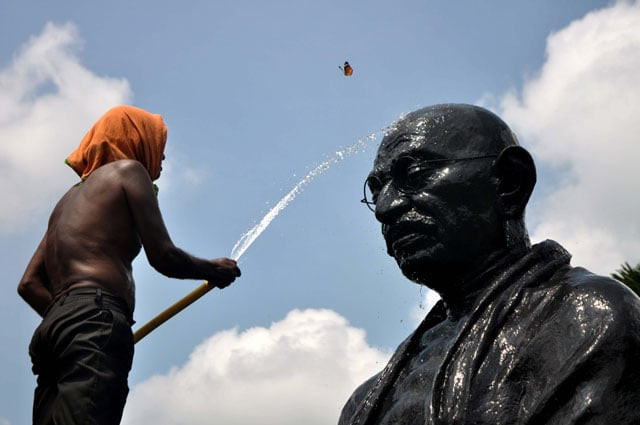Gandhi and friend honoured in Lithuania
Gandhi developed a deep friendship with the wealthy Kallenbach after they met in 1903

A butterfly flutters as an Indian labourer showers water onto a statue of Mahatma Gandhi on the eve of Gandhi Jayanti at Gandhi Park in the eastern city Bhubenaswar on October 1, 2015. Gandhi Jayanti is also observed as International Day of Non-Violence and is celebrated in India to mark the occasion of the birth anniversary of Mahatma Gandhi. PHOTO: AFP
The bronze statue shows Gandhi standing by architect Hermann Kallenbach, who was born to Jewish parents in what today is Lithuania, in a testament to a decades-long friendship which began in Apartheid-era South Africa more than a century ago.
Read: Gandhi and Mandela have future test series named after them
Prime Minister Algirdas Butkevicius hailed the "friendship between two people, between two nations" as he unveiled the 1.8-metre (six-foot) statue in the western town of Rusne.
Both Gandhi and Kallenbach, a German citizen, arrived in South Africa as immigrants in their thirties. Gandhi developed a deep friendship with the wealthy Kallenbach after they met in 1903.
The architect donated land and financial resources to help Gandhi set up Tolstoy Farm, the community that became the headquarters of his non-violence movement - a radical move in racially-segregated South Africa.
Read:
Attending Friday's ceremony, Tushar Gandhi, the leader's great-grandson, drew parallels between the Indian and Baltic independence movements, both rooted in non-violent struggle.
Whereas Gandhi inspired massive civil disobedience in India to shake off British colonialism in 1947, the so-called "Singing Revolutions" helped Lithuania and fellow Baltic states Latvia and Estonia break free from the crumbling Soviet Union a quarter-century ago.
"We share the heritage of having won our independence from very strong, powerful coloniser. And we've both done it in almost identical manner -- using mass protests which were non-violent," Tushar Gandhi told AFP.



















COMMENTS
Comments are moderated and generally will be posted if they are on-topic and not abusive.
For more information, please see our Comments FAQ